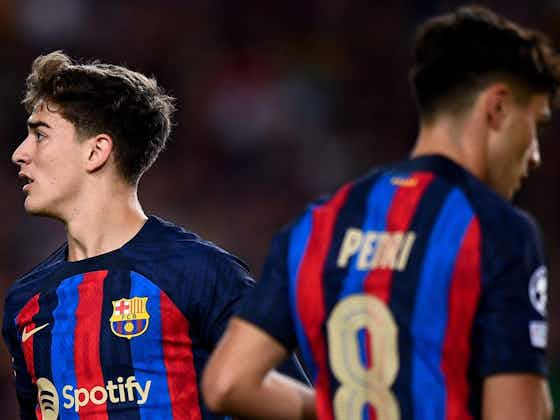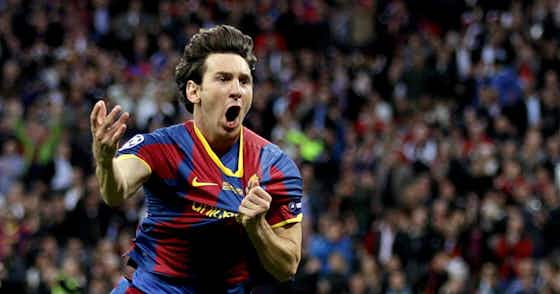Planet Football
·16 January 2023
Gavi, Pedri and the hope that Barcelona can rule in the post-Messi era

In partnership with
Yahoo sportsPlanet Football
·16 January 2023

That’s the day a youngster named Pablo Martin Paez Gavira was born in the province of Seville. Out in the coastal town of Bajamar in Tenerife, Pedro Gonzalez Lopez has just about learned to walk and talk. Today, we know them as Gavi and Pedri.
The landscape of Spanish football appeared very different back then. Valencia were the reigning La Liga champions, their second title in three years, while Deportivo La Coruna were still regularly finishing in the top two.
Barcelona had just endured a fifth successive trophyless season, their longest barren run in the post-war era.
But something was happening at the club. New president Joan Laporta had started a process that would change Barcelona forever. Frank Rijkaard had just led the club to second and there was a renewed sense of optimism ahead of the 2004-05 campaign.
Ronaldinho was the first marquee signing of the Laporta presidency and soon enough the Brazilian became the best player in Spain, if not the world.
Xavi Hernandez had long established himself as a classy operator in midfield and fellow La Masia academy graduate Andres Iniesta had emerged as another quality prospect.
An Argentinian kid by the name of Lionel Messi was generating hype, having caught the eye in a friendly against Jose Mourinho’s Porto the previous November, and was a few months off scoring on his competitive debut.
Rijkaard’s Barcelona won the La Liga title in 2004-05. A league and Champions League double followed in the next season. This heralded a new era for the Catalan club, the greatest in their history.
In the 15 years between 2004 and 2019, Barcelona won 10 La Liga titles, six Copa del Rey and four Champions Leagues.
Messi became the club’s all-time top scorer with 672 goals in all competitions. Xavi and Iniesta joined the No.10 on the Ballon d’Or podium in 2010, the peak of a midfield partnership that defined a historic era for Spain and Barcelona.
• • • •

• • • •
This was the era in which Gavi and Pedri grew up. All they had ever known was Barcelona as an all-conquering superforce.
But the Barcelona where they’ve developed into two of the best young players in Europe is not that club. This Barcelona is more akin to that of 2004; a broken club in the process of fixing itself.
Xavi departed in 2015, Iniesta went to Japan three years later. Three years after that Messi left for Paris Saint-Germain because the club literally couldn’t afford to renew his contract. Gerard Pique has since retired and Sergio Busquets looks likely to leave when his contract expires this summer.
One by one the symbols of Barcelona’s imperial era are ebbing away, and with them their supremacy.
Barcelona haven’t won La Liga in three years, their longest run without a league title since Gavi was born. They’ve gone out of the Champions League in the group stage two years running, having reached the knockouts for two decades straight between 2001 and 2021.
However, the end of one cycle has brought a renewed sense of opportunity – a space to fill in which a new generation can write their own legends. That was the case for Xavi and Iniesta. And now too Gavi and Pedri.
If it wasn’t already blindingly obvious that the prodigiously talented duo are Barcelona’s future, they hammered the point home with dazzling performances in the 2023 Spanish Super Cup final victory over Real Madrid.
When Madrid won 3-1 in the last Clasico at the Bernabeu in October, Toni Kroos and Luka Modric looked experienced, wisened, more astute. Here, losing by the same scoreline, they were made to look old, leggy and past their best as Gavi and Pedri zipped around them with vim and vigour.
“I’m so pleased,” Xavi told reporters after claiming his first piece of silverware as Barcelona manager.
“You know I care a lot about how we win. Sometimes we win but we are not sharp, or we don’t play as we expect to, and I can’t go home fully happy.
“The ‘how’ is always our motto, what we plan around. The day before the match we thought about how to create overloads with four midfielders. Gavi could not read it any better. Pedri, Busquets, and Frenkie de Jong were phenomenal too in that regard.”
It’s apt that Xavi picked out the four midfielders for praise. They were instrumental in executing the total control demanded by their dogmatic coach.
Busquets and De Jong are no surprise. We’ve seen Busquets do it at Barcelona for over a decade. De Jong came up through Ajax’s academy and arrived at Barcelona a £65million superstar.
But let’s not forget Gavi and Pedri are only 18 and 20 years old respectively. What they’re capable of so young is extraordinary.
“Remarkable,” assessed Owen Hargreaves on BT Sport.
“Xavi is such an exceptional young coach. They play in the Barcelona way. Gavi and Pedri are two of the best young midfielders in the world.”
Not only were they instrumental in dictating Xavi’s gameplan, but their fingerprints were all over the final result. It was Gavi that scored the opener, before assisting Robert Lewandowski for the second. The teenager then set up Pedri to put the game beyond Madrid’s reach.
This is still a work in progress. Less than 12 months have passed since Barca thrashed Madrid 4-0 at the Bernabeu and there have been plenty of bumps along the way since then. There remain major question marks over the health of the club’s finances. Ultimately winning the Super Cup will be forgotten if Xavi’s side fail to build on it.
But this trophy can be a turning point. Gavi and Pedri represent hope that Barcelona can rule the world once again.




















